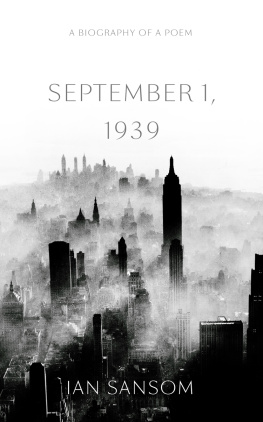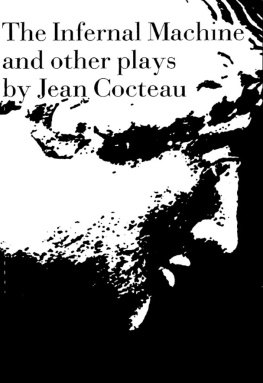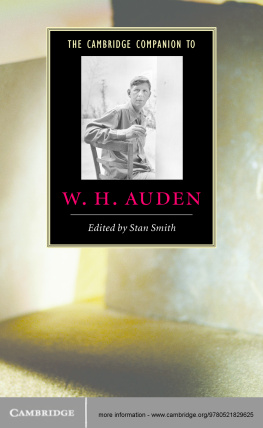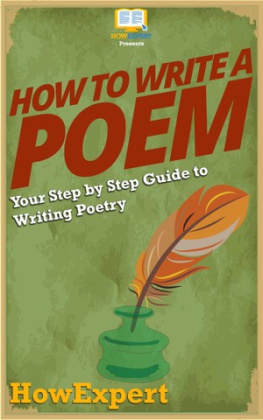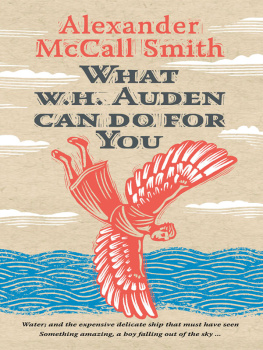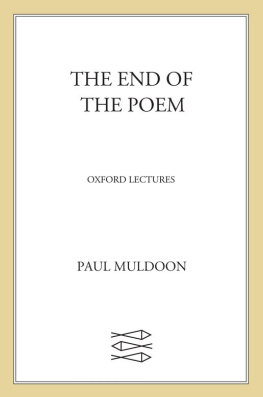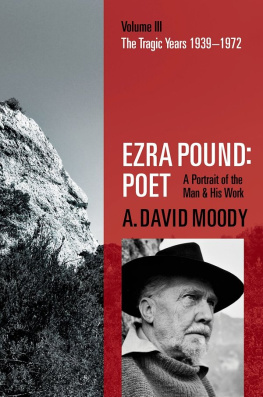4th Estate
An imprint of HarperCollinsPublishers
1 London Bridge Street
London SE1 9GF
www.4thEstate.co.uk
This eBook first published in Great Britain by 4th Estate in 2019
Copyright Ian Sansom 2019
Ian Sansom asserts the moral right to be identified as the author of this work
Unpublished writings by W. H. Auden are quoted with the permission of the Estate of W. H. Auden.
September 1, 1939 from Another Time by W. H. Auden (1940, Faber & Faber).
A catalogue record for this book is available from the British Library
All rights reserved under International and Pan-American Copyright Conventions. By payment of the required fees, you have been granted the non-exclusive, non-transferable right to access and read the text of this e-book on screen. No part of this text may be reproduced, transmitted, down-loaded, decompiled, reverse engineered, or stored in or introduced into any information storage and retrieval system, in any form or by any means, whether electronic or mechanical, now known or hereinafter invented, without the express written permission of HarperCollins.
Source ISBN: 9780007557219
Ebook Edition July 2019 ISBN: 9780007557226
Version: 2019-08-02
For N. J. Humphrey
At just after five oclock on 11 June 1956, W. H. Auden stood up to give his inaugural lecture as Oxford Professor of Poetry at the Sheldonian Theatre, the very heart of the university, adjacent to the Bodleian and the Clarendon Building, opposite Blackwells bookshop on Broad Street, and a short walk from Audens old college, Christ Church.
It was a warm afternoon. Auden, famously crumpled, had enjoyed, I imagine, a good lunch and was sweating in his thick black MA gown with its distinctive, gaudy crimson shot-silk hood. He was buzzing: he had long since adopted a strict chemical daily routine to enable him to work more efficiently. These labor-saving devices, in what he called his mental kitchen, included not only strategic quantities of alcohol, coffee and tobacco, but also the amphetamine Benzedrine, as a pick-me-up at breakfast, and the barbiturate Seconal, to bring him down at night. If you ever get that depressed unable-to-concentrate feeling, try taking Benzidrine [sic] Tablets, he advised his friend Annie Dodds, but not too many.
The Sheldonian was full: the audience were expectant. The University Chancellor, the Vice-Chancellor and the Proctors were in full fig black gowns, gold lace, white tie. The undergraduates and graduate students wore subfusc and were crammed into the high-tiered seating under the lurid sunburst-orange ceiling fresco by King Charles IIs court painter Robert Streater, which depicts Truth descending upon the Arts and Sciences like the wolf on the fold, dispelling ignorance from the university.
It was quite a return.
In 1928 Auden had left Oxford with a miserable Third in English, and his appointment as professor was not without controversy. The university elects its Professor of Poetry unusually indeed, uniquely by a vote among its graduates, and Auden remained a divisive figure in England. The two other candidates were Harold Nicolson, a well-connected author, diplomat, politician and husband to Vita Sackville-West, and G. Wilson Knight, an eminent and massively prolific Shakespeare scholar, author of both the standard work on Shakespearean tragedy, The Wheel of Fire (1930), and the bestselling The Sceptred Isle: Shakespeares Message for England at War (1940).
Nicolson and Wilson Knight had obvious merits they were sensible, distinguished, learned individuals. And they were easily and identifiably English. Auden, in contrast, was an eccentric, remote, supernational sort of a figure, a poet celebrity, English-born but now a self-proclaimed New Yorker who had developed a strange, drawling mid-Atlantic accent recently further complicated after hed had his few final teeth removed and been fitted with dentures and who made a living on the circuit, touring American campuses delivering his lectures and reading his poems. He saw himself as a kind of itinerant preacher:
An air-borne instrument I sit,
Predestined nightly to fulfil
Columbia-Giesen-Managements
Unfathomable will,
By whose election justified,
I bring my gospel of the Muse
To fundamentalists, to nuns,
to Gentiles and to Jews.
(Auden, On the Circuit)
Audens usual touring schedule did not include the English Midlands. The closest he came was spending his summers in bohemian fashion on the Italian island of Ischia with his lover Chester Kallman. (They engaged a handsome local boy known as Giocondo, notes one biographer, to look after the house, and possibly also to provide sexual services.) Though popular among undergraduates, who werent entitled to vote, Auden was not considered a serious candidate for the professorship by the more senior members of the university.
There was also the small matter of his having abandoned England in 1939, and having taken the oath of allegiance and become an American citizen in 1946, something he was never allowed to forget, and for which he was certainly never forgiven. On learning of Audens death in 1973, the novelist Anthony Powell was rendered almost speechless with joy and disgust, declaring, Im delighted that shit has gone It should have happened years ago Scuttling off to America in 1939 with his boyfriend like a like a In 1956, memories of the war were still fresh. G. Wilson Knight had served as a dispatch rider in World War I, and in World War II Nicolson had been parliamentary secretary at the Ministry of Information. Audens war record was rather less distinguished. When he had left England in 1939, questions were asked in Parliament about his departure: he was a disappointment to the nation. When he arrived back in London at the end of the war, wearing his honorary US Army majors uniform, as part of his role in the US Strategic Bombing Survey, people were appalled.
But if England wasnt too sure about Auden, Auden wasnt at all sure he wanted to spend too much time in England delivering the one lecture per term required by the university statutes. The winter months, he wrote to Enid Starkie, the flamboyant, publicity-seeking, cigar-smoking Rimbaud scholar who had proposed him as a candidate, are those in which I earn enough dollars to allow me [] to devote myself to the unprofitable occupation of writing poetry. I do not see any way in which I could earn the equivalent if I had to reside in England during that period. Nonetheless, he allowed his nomination to go forward.
On Thursday, 9 February 1956, the result was announced.
Wilson Knight had attracted just 91 votes. Nicolson had secured 192. And Auden topped the poll with 216. He was therefore elected as professor, succeeding his old friend Cecil Day Lewis.
You have chosen for your new Professor, Auden began his inaugural lecture typically teasing and self-effacing someone who has no more right to the learned garb he is wearing than he would have to a clerical collar. Setting out the terms of his professorship, he went on:
Speaking for myself, the questions which interest me most when reading a poem are two. The first is technical: Here is a verbal contraption. How does it work? The second is, in the broadest sense, moral: What kind of a guy inhabits this poem? What is his notion of the good life or the good place? His notion of the Evil One? What does he conceal from the reader? What does he conceal even from himself?
This book does a very simple thing. It asks Audens two obvious questions of his own poem September 1, 1939. How does it work? And what kind of a guy inhabits this poem?

